Faces from Latin American History, Culture, Politics, and Social Struggles

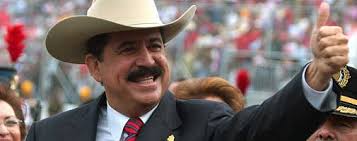
Manuel Zelaya (born 1952), reformist president of Honduras, was ousted in a coup in June 2009, after three years in office. Repression has been widespread under the following governments, which the U.S. has supported.
HONDURAS - Manuel Zelaya
 Manuel Zelaya (born 1952), reformist president of Honduras, was ousted in a coup in June 2009, after three years in office. Repression has been widespread under the following governments, which the U.S. has supported.
Manuel Zelaya (born 1952), reformist president of Honduras, was ousted in a coup in June 2009, after three years in office. Repression has been widespread under the following governments, which the U.S. has supported.
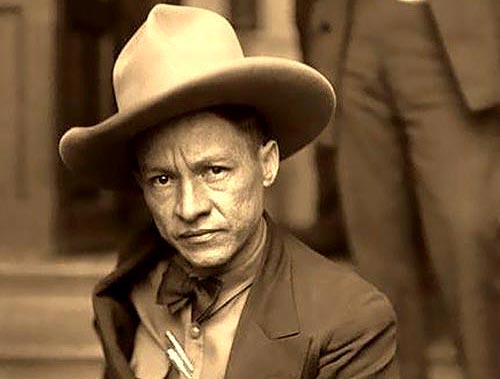
Augusto César Sandino (1985-1934) led the armed resistance to the U.S. military occupation of Nicaragua from 1927 to 1933 and became an anti-imperialist hero throughout Latin America. He was assassinated on the order of Anastasio Somoza, who created a dynasty that ruled Nicaragua until 1979, when his son was overthrown in the revolution led by the Sandinista National Liberation Front, named in his honor.
Nicaragua - Augusto César Sandino

Augusto César Sandino (1985-1934) led the armed resistance to the U.S. military occupation of Nicaragua from 1927 to 1933 and became an anti-imperialist hero throughout Latin America. He was assassinated on the order of Anastasio Somoza, who created a dynasty that ruled Nicaragua until 1979, when his son was overthrown in the revolution led by the Sandinista National Liberation Front, named in his honor.
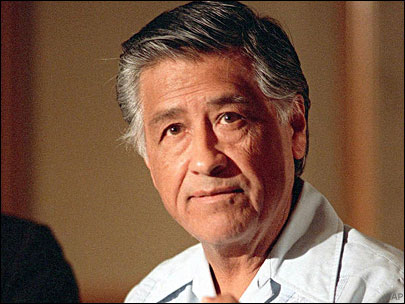
MEXICO-USA border - César Chavez (1927-1993,) born in Arizona, worked as a migrant farmworker in California. With Dolores Huerta, he organized what would become the United Farm Workers. The union became known for its non-violent tactics such as a national grape boycott, “pilgimages” or long marches by farmworkers, cultural organizing through the Teatro Campesino, and a series of fasts by Chavez, including one that lasted 25 days.
MEXICO-USA border- César Chavez
 Chavez (1927-1993,) born in Arizona, worked as a migrant farmworker in California. With Dolor es Huerta, he organized what would become the United Farm Workers. The union became known for its non-violent tactics such as a national grape boycott, “pilgimages” or long marches by farmworkers, cultural organizing through the Teatro Campesino, and a series of fasts by Chavez, including one that lasted 25 days.
Chavez (1927-1993,) born in Arizona, worked as a migrant farmworker in California. With Dolor es Huerta, he organized what would become the United Farm Workers. The union became known for its non-violent tactics such as a national grape boycott, “pilgimages” or long marches by farmworkers, cultural organizing through the Teatro Campesino, and a series of fasts by Chavez, including one that lasted 25 days.
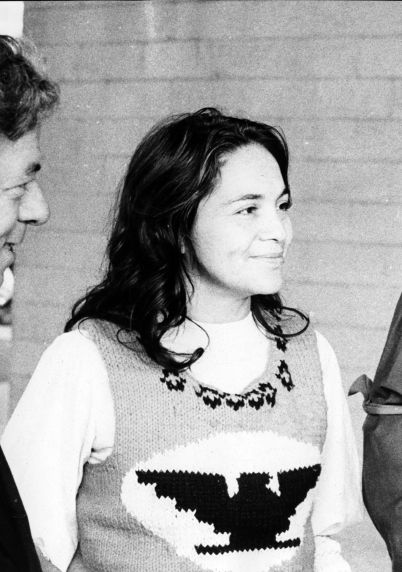
Mexico-US border - Dolores Huerta (born 1930) was a farm labor organizer and co-founder of the United Farm Workers with Cesar Chavez. She directed the national grape boycott in 1965 and was arrested several times for civil disobedience. In 1988 during a peaceful protest at a political event for then-candidate George H. W. Bush, she was beaten and seriously injured by police. She remains active in the movements for labor, women’s and immigrants’ rights.
Mexico-US border - Dolores Huerta

Mexico-US border - Dolores Huerta (born 1930) was a farm labor organizer and co-founder of the United Farm Workers with Cesar Chavez. She directed the national grape boycott in 1965 and was arrested several times for civil disobedience. In 1988 during a peaceful protest at a political event for then-candidate George H. W. Bush, she was beaten and seriously injured by police. She remains active in the movements for labor, women’s and immigrants’ rights.

Mexico - José Clemente Orozco (1883-1949) was one of the famed Mexican muralists whose paintings reflected the social ferment of the Mexican Revolution. Much of his work portrays the human suffering of revolutionary violence. His frescoes also depict the history of Mexico from the indigenous civilizations of the pre-conquest era to the Revolution.
Mexico - José Clemente Orozco

Mexico - José Clemente Orozco (1883-1949) was one of the famed Mexican muralists whose paintings reflected the social ferment of the Mexican Revolution. Much of his work portrays the human suffering of revolutionary violence. His frescoes also depict the history of Mexico from the indigenous civilizations of the pre-conquest era to the Revolution.
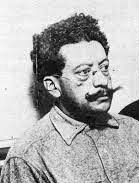
Ricardo Flores Magón (1874-1922,) was an anarchist intellecual and organizer who was influential in triggering the Mexican Revolution. He edited the newspaper Regeneración, wrote extensively, and was a leader of the revolutionary PLM (Mexican Liberal Party.) In exile in the U.S. from 1904, he continued to organize and was repeatedly imprisoned by U.S. authorities. Arrested for the last time during the Palmer raids, he died in Leavenworth Penitentiary.
Mexico - Ricardo Flores Magón

Ricardo Flores Magón (1874-1922,) was an anarchist intellecual and organizer who was influential in triggering the Mexican Revolution. He edited the newspaper Regeneración, wrote extensively, and was a leader of the revolutionary PLM (Mexican Liberal Party.) In exile in the U.S. from 1904, he continued to organize and was repeatedly imprisoned by U.S. authorities. Arrested for the last time during the Palmer raids, he died in Leavenworth Penitentiary.
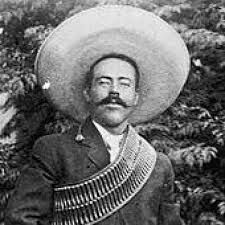
Pancho Villa (1878-1923) was the leading revolutionary general in northern Mexico.in the period of 1910-1915. In the internal struggles for leadership of the Revolution, he fought against Gens. Huerta and Carranza and allied with Zapata. His brief raid on Columbus, New Mexico in 1916 to obtain munitions led to a U.S. invasion of northern Mexico in an unsuccessful attempt to capture him that lasted almost a year.
Mexico - Pancho Villa

Pancho Villa (1878-1923) was the leading revolutionary general in northern Mexico.in the period of 1910-1915. In the internal struggles for leadership of the Revolution, he fought against Gens. Huerta and Carranza and allied with Zapata. His brief raid on Columbus, New Mexico in 1916 to obtain munitions led to a U.S. invasion of northern Mexico in an unsuccessful attempt to capture him that lasted almost a year.

Diego Rivera (1886-1957) was the muralist whose massive frescoes on public buildings in Mexico celebrated the revolution and indigenous culture and denounced colonialism, capitalism, and imperialism. He was invited to create murals in the U.S, including one at Rockefeller Center, which was removed because it included the image of Lenin.
Mexico - Diego Rivera

Diego Rivera (1886-1957) was the muralist whose massive frescoes on public buildings in Mexico celebrated the revolution and indigenous culture and denounced colonialism, capitalism, and imperialism. He was invited to create murals in the U.S, including one at Rockefeller Center, which was removed because it included the image of Lenin.
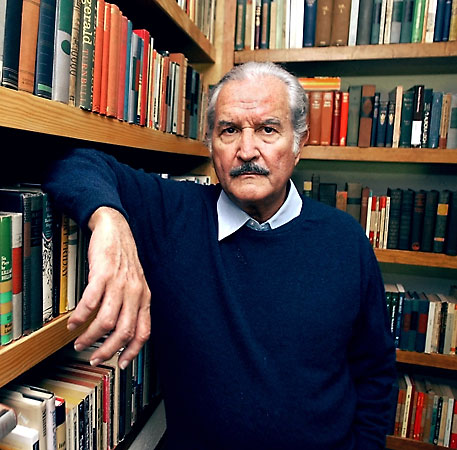
Carlos Fuentes (1928-2012) was the son of a Mexican diplomat who lived in several Latin American countries and the U.S. during his youth. During his time in Chile, he was influenced by the poetry and political activism of Pablo Neruda. His best-known novels The Death of Artemio Cruz and The Old Gringo are set during the Mexican Revolution. He was an early supporter of the Cuban and Sandinista revolutions.
Mexico - Carlos Fuentes

Carlos Fuentes (1928-2012) was the son of a Mexican diplomat who lived in several Latin American countries and the U.S. during his youth. During his time in Chile, he was influenced by the poetry and political activism of Pablo Neruda. His best-known novels The Death of Artemio Cruz and The Old Gringo are set during the Mexican Revolution. He was an early supporter of the Cuban and Sandinista revolutions.
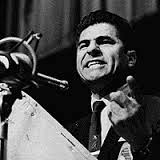
Mexico - USA - Reies Lopez Tijerina (1926-2015) was an early leader of what became the Chicano movement. Born in Texas, he became a leader of La Alianza, a New Mexico movement to reclaim Spanish land grant territories whose titles had been transferred to Anglo settlers in the 19th century in violation of the Treaty of Guadalupe Hidalgo. After conflicts with local authorities, he continued his work as a fugitive. In 1967, he led an armed raid on Tierra Amarilla, New Mexico to free jailed Alianza members. His trial received national attention and mobilized support from activists in the incipient Chicano movement.
Mexico - Reies Lopez Tijerina

Mexico/USA - Reies Lopez Tijerina (1926-2015) was an early leader of what became the Chicano movement. Born in Texas, he became a leader of La Alianza, a New Mexico movement to reclaim Spanish land grant territories whose titles had been transferred to Anglo settlers in the 19th century in violation of the Treaty of Guadalupe Hidalgo. After conflicts with local authorities, he continued his work as a fugitive. In 1967, he led an armed raid on Tierra Amarilla, New Mexico to free jailed Alianza members. His trial received national attention and mobilized support from activists in the incipient Chicano movement.
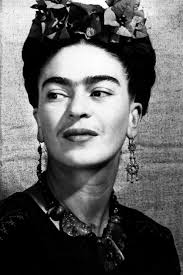
Mexico - Frida Kahlo (1907-1954) was the groundbreaking feminist artist whose self-portraits also celebrated Mexico’s indigenous cultures. She and her sometimes-husband muralist Diego Rivera were both Communist activists who opened their homes to Trotsky at the start of his Mexican exile but later broke with him to support Stalin.
Mexico - Frida Kahlo

Frida Kahlo 2 Mexico (1907-1954) was the groundbreaking feminist artist whose self-portraits also celebrated Mexico’s indigenous cultures. She and her sometimes-husband muralist Diego Rivera were both Communist activists who opened their homes to Trotsky at the start of his Mexican exile but later broke with him to support Stalin.
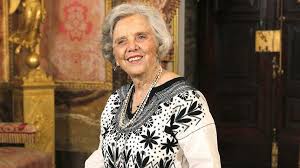
Mexico - Elena Poniatowska (born 1932) is the versatile author who came to prominence as a political writer for her 1971 La noche de Tlatelolco (titled Massacre in Mexico in English, a “testimonial narrative” which recounted the massacre of student protesters at Tlatelolco Plaza in Mexico City in 1968. She has shaped Mexican journalism and literature not only as a writer but as a founder of the newspaper La Jornada, the feminist magazine Fern, and the Sigo XXI publishing house.
Mexico - Elena Poniatowska

Mexico - Elena Poniatowska (born 1932) is the versatile author who came to prominence as a political writer for her 1971 La noche de Tlatelolco (titled Massacre in Mexico in English, a “testimonial narrative” which recounted the massacre of student protesters at Tlatelolco Plaza in Mexico City in 1968. She has shaped Mexican journalism and literature not only as a writer but as a founder of the newspaper La Jornada, the feminist magazine Fern, and the Sigo XXI publishing house.
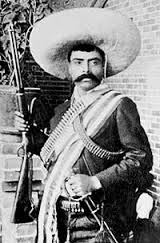
Mexico - Emiliano Zapata (1879-1919) led a peasant army during the Mexican Revolution and his Plan de Ayala demanded radical land reform. After the ovethrow of Díaz, his forces fought against a series of presidents and he was eventually murdered by Carranza’s forces. He became a symbol of revolutionary ideals and his struggle lives on in today’s Zapatista movement.
Mexico - Emiliano Zapata

Mexico - Emiliano Zapata (1879-1919) led a peasant army during the Mexican Revolution and his Plan de Ayala demanded radical land reform. After the ovethrow of Díaz, his forces fought against a series of presidents and he was eventually murdered by Carranza’s forces. He became a symbol of revolutionary ideals and his struggle lives on in today’s Zapatista movement.
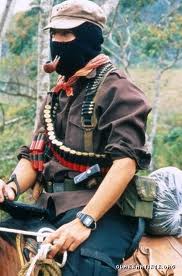
Mexico - Subcomandante Marcos (born 1957) is the political name taken by the leader of the Zapatista National Liberation Army, who is believed to be former philosophy professor Rafael Sebastián Guillén Vicente. The Zapatista uprising began on the first day that NAFTA went into effect. Its armed resistance to neoliberal capitalism was directed at creating autonomous self-governing communities, not at seizing state power.
Mexico - Subcomandante Marcos

Mexico - Subcomandante Marcos (born 1957) is the political name taken by the leader of the Zapatista National Liberation Army, who is believed to be former philosophy professor Rafael Sebastián Guillén Vicente. The Zapatista uprising began on the first day that NAFTA went into effect. Its armed resistance to neoliberal capitalism was directed at creating autonomous self-governing communities, not at seizing state power.
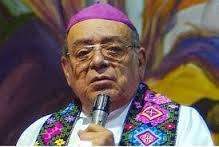
Mexico - Bishop Samuel Ruiz (1924-2011) became Bishop of San Cristóbal de las Casas, Chiapas in 1960. Influenced by liberation theology and the poverty of the indigenouis popoultion of his diocese, he became an advocate of structural change. After the Zapatista uprising began in 1994, he mediated between the Zapatistas and the national government.
Mexico - Bishop Samuel Ruiz

Mexico - Bishop Samuel Ruiz (1924-2011) became Bishop of San Cristóbal de las Casas, Chiapas in 1960. Influenced by liberation theology and the poverty of the indigenouis popoultion of his diocese, he became an advocate of structural change. After the Zapatista uprising began in 1994, he mediated between the Zapatistas and the national government.
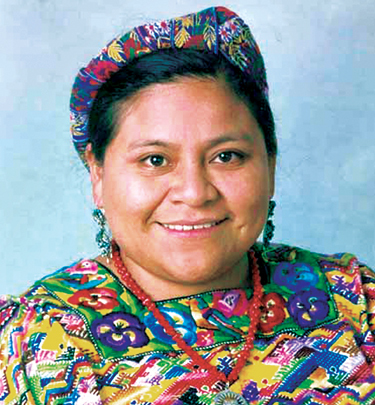
Rigoberta Menchu (born 1959) won the Nobel Peace Prize in 1992 for her defense of human and indigenous rights against the state terror of the U.S.-supported Guatemalan military government which killed or disappeared an estimated 200,000 indigenous people from 1960-1996, incluiding her parents. She describes the violence in her book I, Rigoberta Menchu.
Guatemala - Rigoberta Menchu

Rigoberta Menchu (born 1959) won the Nobel Peace Prize in 1992 for her defense of human and indigenous rights against the state terror of the U.S.-supported Guatemalan military government which killed or disappeared an estimated 200,000 indigenous people from 1960-1996, incluiding her parents. She describes the violence in her book I, Rigoberta Menchu.
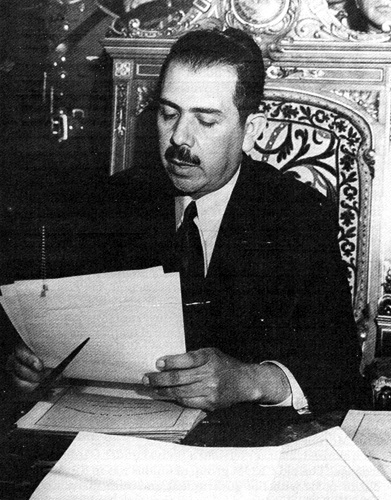
Mexico - Lázaro Cárdenas (1895-1970) was President of Mexico from 1934 to 1940. His presidency is considered the high point of reform during the Mexican Revolution. Some of the most significant reforms were nationalization of oil and the creation of ejidos, the collective land titles granted to indigenous and peasant communities.
Mexico - Lázaro Cárdenas

Mexico - Lázaro Cárdenas (1895-1970) was President of Mexico from 1934 to 1940. His presidency is considered the high point of reform during the Mexican Revolution. Some of the most significant reforms were nationalization of oil and the creation of ejidos, the collective land titles granted to indigenous and peasant communities.
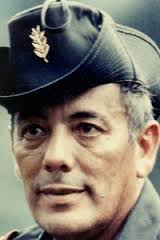
Omar Torrijos Nationalist, populist leader Omar Torrijos (1929-1981) successfully negotiated the Torrijos-Carter Treaties signed in 1977 that returned the Panama Canal to Panamanian sovereignty, a process completed in 1999. He was killed in a small plane crash that some consider an assassination.
Panama - Omar Torrijos

Omar Torrijos Nationalist, populist leader Omar Torrijos (1929-1981) successfully negotiated the Torrijos-Carter Treaties signed in 1977 that returned the Panama Canal to Panamanian sovereignty, a process completed in 1999. He was killed in a small plane crash that some consider an assassination.

Cuba - Fidel Castro (born 1926) led the armed struggle that defeated the U.S.-backed Batista dictatorship in 1959. He evolved from a liberal anti-imperialist to a Marxist-Leninist and, as head of the Communist Party of Cuba, led the Cuban Revolution for almost 50 years. The revolution won admiration among the international left for its egalitarian domestic policies such as free universal education and health care and its internationalist support for social struggles throughout the global South.
Cuba - Fidel Castro

Fidel Castro (born 1926) led the armed struggle that defeated the U.S.-backed Batista dictatorship in 1959. He evolved from a liberal anti-imperialist to a Marxist-Leninist and, as head of the Communist Party of Cuba, led the Cuban Revolution for almost 50 years. The revolution won admiration among the international left for its egalitarian domestic policies such as free universal education and health care and its internationalist support for social struggles throughout the global South.

Haiti - Toussaint Louverture (1743-1803,) born a slave but later freed, was a leader of the slave revolt that began in 1791 and culminated in the founding of the Republic of Haiti in 1804, the first colony in the Americas to become independent after the U.S. and the only one with a black-led government. Louverture was arrested by French forces in 1803 and died in prison in France before the final victory of the revolution.
Haiti - Toussaint Louverture

Toussaint Louverture (1743-1803,) born a slave but later freed, was a leader of the slave revolt that began in 1791 and culminated in the founding of the Republic of Haiti in 1804, the first colony in the Americas to become independent after the U.S. and the only one with a black-led government. Louverture was arrested by French forces in 1803 and died in prison in France before the final victory of the revolution.
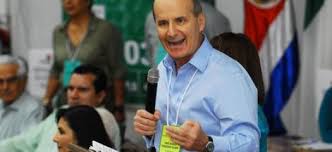
Costa Rica - Jose Figueres Social democrat José Figueres (1906-1990), who had attempted to form an armed movement to remove Central American dictators, became president in 1948 following a short civil war over a disputed election. He is best known for the reforms enacted during his first term, which included abolishing the army. However, he also outlawed the Communist party.
Costa Rica - José Figueres

Jose Figueres Social democrat José Figueres (1906-1990), who had attempted to form an armed movement to remove Central American dictators, became president in 1948 following a short civil war over a disputed election. He is best known for the reforms enacted during his first term, which included abolishing the army. However, he also outlawed the Communist party.

The Cuban Five are Cuban intelligence agents who infiltrated extremist exile groups in Florida who were involved in militant actions against the Cuban government, including terrorism. When they reported their evidence to the U.S. government in 1998, they were arrested, convicted as spies, and sentenced to prison terms of 13 years to life. In a prisoner exchange agreement in 2014, the three still in prison were returned to Cuba.
Florida - The Cuban Five

The Cuban Five are Cuban intelligence agents who infiltrated extremist exile groups in Florida who were involved in militant actions against the Cuban government, including terrorism. When they reported their evidence to the U.S. government in 1998, they were arrested, convicted as spies, and sentenced to prison terms of 13 years to life. In a prisoner exchange agreement in 2014, the three still in prison were returned to Cuba.
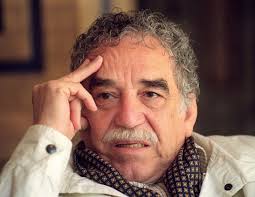
Columbia - Gabriela Garcia Marquez (1927-2014), who won the Nobel Prize for Literature in 1982, began his writing career as a journalist before becoming the novelist noted for socially conscious, “magical realist” narratives such as One Hindred Years of Solitude. In both his literary work and life as a leftist public intellectual, he denounced repression and supported revolutionary struggles for social justice.
Columbia - Gabriela Garcia Marquez

Columbia - Gabriela Garcia Marquez (1927-2014), who won the Nobel Prize for Literature in 1982, began his writing career as a journalist before becoming the novelist noted for socially conscious, “magical realist” narratives such as One Hindred Years of Solitude. In both his literary work and life as a leftist public intellectual, he denounced repression and supported revolutionary struggles for social justice.
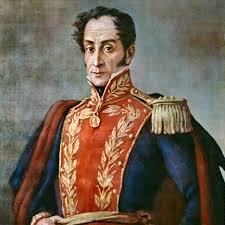
Venezuela - Simón Bolívar (1783-1830) led the struggles for independence from Spain in what today are Venezuela, Colombia, Ecuador, Peru and Bolivia. His vision of a united Latin America has continued to inspire political leaders, most notably the late Venezuelan president Hugo Chavez, who named the Bolivarian Revolution in his honor.
Venezuela - Simón Bolívar

Simón Bolívar (1783-1830) led the struggles for independence from Spain in what today are Venezuela, Colombia, Ecuador, Peru and Bolivia. His vision of a united Latin America has continued to inspire political leaders, most notably the late Venezuelan president Hugo Chavez, who named the Bolivarian Revolution in his honor.
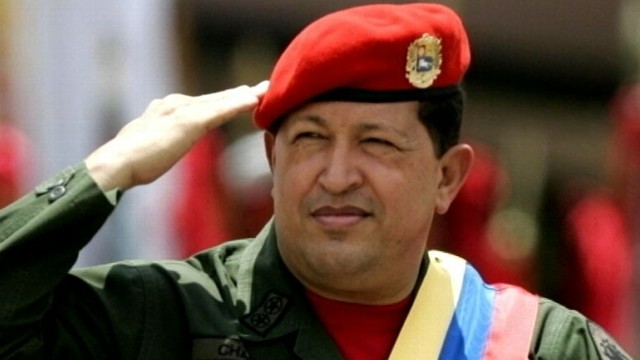
Venezuala - Hugo Chávez (1954-2013) was first elected president in 1998 and was re-elected twice in addition to surviving a coup attempt and recall referendum. His Bolivarianism or vision of 21st century socialism encompassed radical transformation of economic and political structures to benefit the poor majority but engendered unrelenting destabilization efforts by the domestic right supported by the U.S. Chavez also advocated Latin American unity and the creation of new cooperative organizations such as ALBA, the Bolivarian Alternative for the Americas.
Venezuala - Hugo Chávez

Hugo Chávez (1954-2013) was first elected president in 1998 and was re-elected twice in addition to surviving a coup attempt and recall referendum. His Bolivarianism or vision of 21st century socialism encompassed radical transformation of economic and political structures to benefit the poor majority but engendered unrelenting destabilization efforts by the domestic right supported by the U.S. Chavez also advocated Latin American unity and the creation of new cooperative organizations such as ALBA, the Bolivarian Alternative for the Americas.
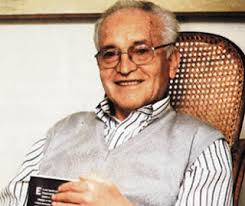
Colombia Orlando - Fals Borda (1925-2008) was an influential sociologist best known for advocating participatory action research in which the researcher seeks to transform society in active collaboration with the communities in which s/he works. With Camilo Torres, he set up the first sociology faculty at the National University of Colombia.
Colombia Orlando - Fals Borda

Fals Borda (1925-2008) was an influential sociologist best known for advocating participatory action research in which the researcher seeks to transform society in active collaboration with the communities in which s/he works. With Camilo Torres, he set up the first sociology faculty at the National University of Colombia.
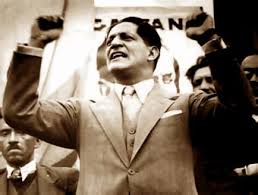
Colombia - Jorge Eliécer Gaitán (1903 -1948) was a radical leader who challenged repressive rule by the Colombian oligarchy. A popular former mayor of Bogotá and Liberal Party cabinet member, he was assassinated during his campaign for president in 1948. His killing triggered the massive riot known as the Bogotazo and “La Violenica,” the decades-long civil war between Liberals and Conservatives.
Colombia - Jorge Eliécer Gaitán

Jorge Eliécer Gaitán (1903 -1948) was a radical leader who challenged repressive rule by the Colombian oligarchy. A popular former mayor of Bogotá and Liberal Party cabinet member, he was assassinated during his campaign for president in 1948. His killing triggered the massive riot known as the Bogotazo and “La Violenica,” the decades-long civil war between Liberals and Conservatives.
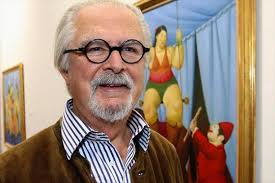
Colombia - Fernando Botero (born 1932) is an internationally known artist whose unique style depicts his subjects in exaggerated, even grotesque, rotund form. Much of his work is political including series on the violence by Colombian drug cartels and the abuses at Abu Ghraib.
Colombia - Fernando Botero

Fernando Botero (born 1932) is an internationally known artist whose unique style depicts his subjects in exaggerated, even grotesque, rotund form. Much of his work is political including series on the violence by Colombian drug cartels and the abuses at Abu Ghraib.
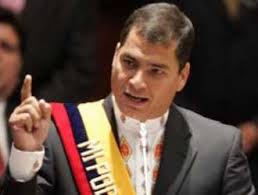
Ecuador - Rafael Correa An internationally-educated economist, Rafael Correa (born 1963) is a Christian leftist and proponent of 21st century socialism who has served as president of Ecuador since 2007. He was elected on an anti-neoliberal platform and his policies have included increased spending on social programs and renegotiating the foreign debt. Many indigenous groups oppose his support of extractive development.
Ecuador - Rafael Correa

Ecuador - Rafael Correa An internationally-educated economist, Rafael Correa (born 1963) is a Christian leftist and proponent of 21st century socialism who has served as president of Ecuador since 2007. He was elected on an anti-neoliberal platform and his policies have included increased spending on social programs and renegotiating the foreign debt. Many indigenous groups oppose his support of extractive development.
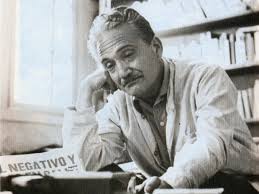
Peru - José María Arguedas (born 1952), reformist president of Honduras, was ousted in a coup in June 2009, after three years in office. Repression has been widespread under the following governments, which the U.S. has supported.
Peru - José María Arguedas

Peru - José María Arguedas (born 1952), reformist president of Honduras, was ousted in a coup in June 2009, after three years in office. Repression has been widespread under the following governments, which the U.S. has supported.
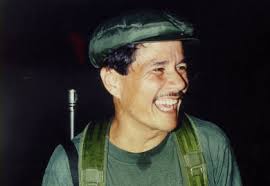
Colombia - Camilo Torres (1929-1966) was a politically-active priest and academic sociologist who practiced liberation theology before it was known by that name. He fully committed himself to the struggle for socialist revolution by joining the guerrilla ELN (National Liberation Army) and was killed in his first combat operation. He inspired many others throughout the hemisphere to fuse Catholicism and armed struggle.
Colombia - Camilo Torres

Colombia - Camilo Torres (1929-1966) was a politically-active priest and academic sociologist who practiced liberation theology before it was known by that name. He fully committed himself to the struggle for socialist revolution by joining the guerrilla ELN (National Liberation Army) and was killed in his first combat operation. He inspired many others throughout the hemisphere to fuse Catholicism and armed struggle.

Cheddi Jagan (1918-1997), who was removed as Premier of British Guiana by British military intervention in 1953 for his Marxist views, held that office again from 1961 to 1964, prior to independence in 1966, and served as President of Guyana from 1992 to 1997 as a democratic socialist. He is widely regarded as the "Father of the Nation."">
Guyana - Cheddi Jagan

Cheddi Jagan (1918-1997), who was removed as Premier of British Guiana by British military intervention in 1953 for his Marxist views, held that office again from 1961 to 1964, prior to independence in 1966, and served as President of Guyana from 1992 to 1997 as a democratic socialist. He is widely regarded as the "Father of the Nation."
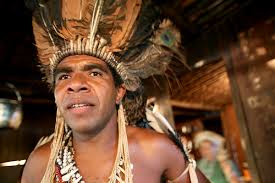
Brazil - Cacique Babau Tupinambá is chief of the indigenous Tupinambá people in Bahia who are struggling for the right to recover their traditional land which has been stolen by non-indigenous ranchers and land developers. In 2010. he and other activists were beaten and imprisoned for reoccupying the disputed land despite their appeals to the government to support their claims. They continue to be subject to atacks by police, who have violently expelled them from some reoccupied land.
Brazil - Cacique Babau Tupinambá

Brazil - Cacique Babau Tupinambá is chief of the indigenous Tupinambá people in Bahia who are struggling for the right to recover their traditional land which has been stolen by non-indigenous ranchers and land developers. In 2010. he and other activists were beaten and imprisoned for reoccupying the disputed land despite their appeals to the government to support their claims. They continue to be subject to atacks by police, who have violently expelled them from some reoccupied land.

Brazil - Frei Betto (born 1944) is a Dominican friar and influential liberation theology thinker and writer. He was imprisoned by the Brazilian dictatorship for four years. Among his well known books is Fidel and Religion, based on conversations with the Cuban leader. In Brazil, he has worked to eliminate hunger and served as an advisor to President Lula da Silva.
Brazil - Frei Betto

Frei Betto (born 1944) is a Dominican friar and influential liberation theology thinker and writer. He was imprisoned by the Brazilian dictatorship for four years. Among his well known books is Fidel and Religion, based on conversations with the Cuban leader. In Brazil, he has worked to eliminate hunger and served as an advisor to President Lula da Silva.

Brazil - Maria Bonita (1911-1938) was the nickname of Maria Déia, the girlfriend of the cangaceiro (outlaw) known as Lampião in the impoverished Brazilian Northeast. Killed in a shoot out with police, she and Lampião became folk heroes and their story has entered into popular culture in songs, cordel (pamphlet) literature, soap operas and films.
Brazil - Maria Bonita

Brazil - Maria Bonita (1911-1938) was the nickname of Maria Déia, the girlfriend of the cangaceiro (outlaw) known as Lampião in the impoverished Brazilian Northeast. Killed in a shoot out with police, she and Lampião became folk heroes and their story has entered into popular culture in songs, cordel (pamphlet) literature, soap operas and films.

Peru - José Carlos Mariátegui (1894-1930), socialist journalist and political theorist, wrote the influential Seven Interpretive Essays on Peruvian Reality (1928) that argued for the adaptation of Marxism to Latin American conditions, including recognition of the importance of communitarian indigenous traditions. He founded the Socialist Party which later became the Communist Party
Peru - José Carlos Mariátegui

José Carlos Mariátegui (1894-1930), socialist journalist and political theorist, wrote the influential Seven Interpretive Essays on Peruvian Reality (1928) that argued for the adaptation of Marxism to Latin American conditions, including recognition of the importance of communitarian indigenous traditions. He founded the Socialist Party which later became the Communist Party

Peru - Gustavo Gutiérrez O.P. (born 1928) is the theologian and Dominican priest whose 1971 book A Theology of Liberation argued that Christianity required social action to change unjust structures and gave the liberation theology movement its name. Conservative sectors of the Catholic church, including Pope John Paul II and then-Cardinal Ratzinger who beame Pope Beneditct XVI, attempted to curb the influence of Gutiérrez and other leading liberation theologians.
Peru - Gustavo Gutiérrez

Gustavo Gutiérrez O.P. (born 1928) is the theologian and Dominican priest whose 1971 book A Theology of Liberation argued that Christianity required social action to change unjust structures and gave the liberation theology movement its name. Conservative sectors of the Catholic church, including Pope John Paul II and then-Cardinal Ratzinger who beame Pope Beneditct XVI, attempted to curb the influence of Gutiérrez and other leading liberation theologians.
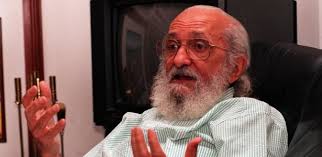
Brazil - Paolo Freire (1921-1997), author of Pedagogy of the Oppressed, advocated education grounded in the social reality of the students. The method was widely used in education for poor, illiterate adults. A Christian socialist, he was forced into exile after the military coup of 1964. He returned to Brazil in 1980 and joined the Workers Party (PT).
Brazil - Paolo Freire

Brazil - Paolo Freire (1921-1997), author of Pedagogy of the Oppressed, advocated education grounded in the social reality of the students. The method was widely used in education for poor, illiterate adults. A Christian socialist, he was forced into exile after the military coup of 1964. He returned to Brazil in 1980 and joined the Workers Party (PT).

Sônia Guajajara from a Guajajara village in the state of Maranhão, is the national coordinator of Brazil's Association of Indigenous Peoples (APIB.) She has fought for indigenous rights against incursions from national and transnational agrobusiness and government plans for dams on the Amazon. In 2014, she took their struggle to the United Nations Human Rights Council in Geneva and led protests at the International Day of Action for Rivers in Paris.
Brazil - Sônia Guajajara

Sônia Guajajara from a Guajajara village in the state of Maranhão, is the national coordinator of Brazil's Association of Indigenous Peoples (APIB.) She has fought for indigenous rights against incursions from national and transnational agrobusiness and government plans for dams on the Amazon. In 2014, she took their struggle to the United Nations Human Rights Council in Geneva and led protests at the International Day of Action for Rivers in Paris.

Brazil - Leonardo Boff (born 1938) is a former Franciscan priest who became an early practitioner of liberation theology. He suffered reprisals for his criticism of the church hierarchy and was silenced several times by then-Cardinial Ratzinger, the future Pope Benedict XVI, and eventually left the priesthood. He has denounced neoliberalism, the Iraq war, and Israeli policy snd is an active environmentalist.
Brazil - Leonardo Boff

Leonardo Boff (born 1938) is a former Franciscan priest who became an early practitioner of liberation theology. He suffered reprisals for his criticism of the church hierarchy and was silenced several times by then-Cardinial Ratzinger, the future Pope Benedict XVI, and eventually left the priesthood. He has denounced neoliberalism, the Iraq war, and Israeli policy snd is an active environmentalist.
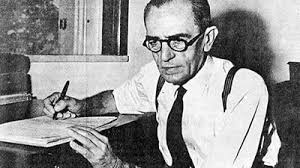
Brazil - Graciliano Ramos (1892-1953) was a Brazilian writer whose work focused on the hardships of poverty in the sertão, or arid Northeast, where he spent his childhood, particularly in the novel Vidas Secas (Barren Lives.) He was imprisoned for alleged participation in the Communist Revolt of 1935 and later joined the Communist Party.
Brazil - Graciliano Ramos

Graciliano Ramos (1892-1953) was a Brazilian writer whose work focused on the hardships of poverty in the sertão, or arid Northeast, where he spent his childhood, particularly in the novel Vidas Secas (Barren Lives.) He was imprisoned for alleged participation in the Communist Revolt of 1935 and later joined the Communist Party.
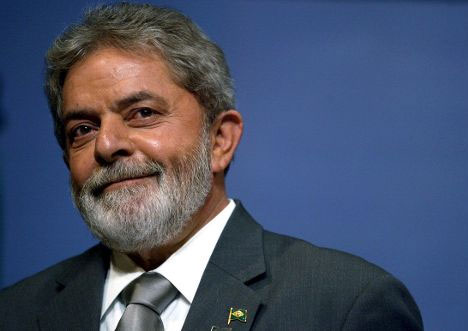
Brazil - Luiz Inácio Lula da Silva (born 1945) began factory work at age 14 and became a labor activist who organized strikes against the military dictatorship. In 1980, he joined other progressive activists to found the Workers Party (PT) which demanded free elections. On his third try, he was elected president in 2002 and served two terms. He introduced progressive social measures that included cash payments to poor families and anti-hunger programs.
Brazil - Luiz Inácio Lula da Silva

Luiz Inácio Lula da Silva (born 1945) began factory work at age 14 and became a labor activist who organized strikes against the military dictatorship. In 1980, he joined other progressive activists to found the Workers Party (PT) which demanded free elections. On his third try, he was elected president in 2002 and served two terms. He introduced progressive social measures that included cash payments to poor families and anti-hunger programs.
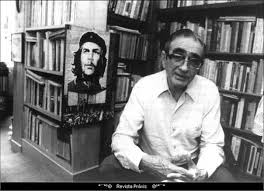
Brazil - Florestan Fernandes (1920-1995) was a major Brazilian sociologist who is known for his work on the influence of race prejudice on class stratification and on the analysis of social classes as the prime force in industrial capitalism. He argued that sociology should focus on bringing about social change.
Brazil - Florestan Fernandes

Brazil - Florestan Fernandes (1920-1995) was a major Brazilian sociologist who is known for his work on the influence of race prejudice on class stratification and on the analysis of social classes as the prime force in industrial capitalism. He argued that sociology should focus on bringing about social change.
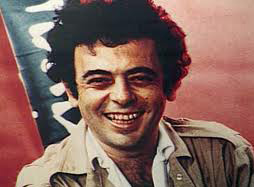
Glauber Rocha (1939-1981) was an influential film director and leader of the Cinema Novo movement. He was known for sytlistically innovative, highly political films that exposed social injustice (Deus e o Diabo na Terra do Sol) and political corruption (Terra em Transe). He went into voluntary exile during the dictatorship.
Brazil - Glauber Rocha

Glauber Rocha (1939-1981) was an influential film director and leader of the Cinema Novo movement. He was known for sytlistically innovative, highly political films that exposed social injustice (Deus e o Diabo na Terra do Sol) and political corruption (Terra em Transe). He went into voluntary exile during the dictatorship.

Brazil - Augusto Boal (1931-2009) was a Brazilian theater director who created the movement Theater of the Oppressed that applied his friend Paulo Freire’s principles of participatory education to drama. During the dictatorship, he was arrested, tortured, and exiled for 14 years. Using theater as a means of empowerment after returning to Brazil, he worked among the urban poor, prisoners, and the movement of landless peasants (MST.)
Brazil - Augusto Boal

Brazil - Augusto Boal (1931-2009) was a Brazilian theater director who created the movement Theater of the Oppressed that applied his friend Paulo Freire’s principles of participatory education to drama. During the dictatorship, he was arrested, tortured, and exiled for 14 years. Using theater as a means of empowerment after returning to Brazil, he worked among the urban poor, prisoners, and the movement of landless peasants (MST.)

Brasil - Dilma Rousseff, Brazil’s first woman president, continues the Workers Party (PT) governance begun by Lula da Silva, for whom she served as Chief of Staff. She began her political life as a student activist and guerrilla fighter against the military dictatorship which resulted in her being imprisoned and tortured. She served in several government posts as a member of the PDT (Democratic Workers Party) before joining the Workers Party in 2000. She began her second term as president in 2014.
Brasil - Dilma Rousseff

Dilma Rousseff, Brazil’s first woman president, continues the Workers Party (PT) governance begun by Lula da Silva, for whom she served as Chief of Staff. She began her political life as a student activist and guerrilla fighter against the military dictatorship which resulted in her being imprisoned and tortured. She served in several government posts as a member of the PDT (Democratic Workers Party) before joining the Workers Party in 2000. She began her second term as president in 2014.

Brazil - Luis Carlos Prestes (1898-1990) was a military officer who helped organize the unsuccessful tenente revolt of 1922 against rule by the Brazilian coffee and cattle oligarchy. In 1924, he led forces known as the Prestes Column on a 25,000 km march through rural Brazil, an experience that led him to oppose guerrilla war as a response to the coup of 1964. An advocate of socialist revolution, he became a Communist leader and his life alternated between prison, exile, and elected office depending on the vicissitudes of Brazilian politics.
Brazil - Luis Carlos Prestes

Luis Carlos Prestes (1898-1990) was a military officer who helped organize the unsuccessful tenente revolt of 1922 against rule by the Brazilian coffee and cattle oligarchy. In 1924, he led forces known as the Prestes Column on a 25,000 km march through rural Brazil, an experience that led him to oppose guerrilla war as a response to the coup of 1964. An advocate of socialist revolution, he became a Communist leader and his life alternated between prison, exile, and elected office depending on the vicissitudes of Brazilian politics.
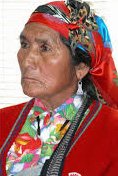
Chile - Nicolasa Quintremán (1939 - 2013) was the Mapuche (Pehuenche) indigenous rights and environmental activist who, with her sister Berta, led a decade-long but ultimately unsuccessful struggle to prevent construction of the Ralco dam on the Bío Bío river in southern Chile by the Chilean-Spanish corporation Endesa. The land flooded by the dam displaced the Mapache community that had lived there and the sisters’ resistance sparked a national and international movement that successfully opposed later hydroelectric projects.
Chile - Nicolasa Quintremán

Chile - Nicolasa Quintremán (1939 - 2013) was the Mapuche (Pehuenche) indigenous rights and environmental activist who, with her sister Berta, led a decade-long but ultimately unsuccessful struggle to prevent construction of the Ralco dam on the Bío Bío river in southern Chile by the Chilean-Spanish corporation Endesa. The land flooded by the dam displaced the Mapache community that had lived there and the sisters’ resistance sparked a national and international movement that successfully opposed later hydroelectric projects.

Brazil - Celso Furtado (1920-2004) was an economist with CEPAL (UN Economic Commission on Latin America) and UNCTAD (the United Nations Conference on Trade and Development) who proposed structural explanations for underdevelopment in Latin America. He held numerous positions in Brazilian governments but was forced into exile during the military dictatorship. Dependency theorists, while recognizing structural inequalities, challenged many of his developmentalist ideas and policies from the left.
Brazil - Celso Furtado

Celso Furtado (1920-2004) was an economist with CEPAL (UN Economic Commission on Latin America) and UNCTAD (the United Nations Conference on Trade and Development) who proposed structural explanations for underdevelopment in Latin America. He held numerous positions in Brazilian governments but was forced into exile during the military dictatorship. Dependency theorists, while recognizing structural inequalities, challenged many of his developmentalist ideas and policies from the left.
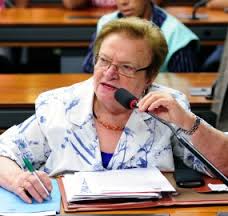
Luiza Erundina (born 1934) was elected the first woman mayor of São Paulo representing the Workers Party (PT), serving from 1989 to 1992. Her administration prioritized social services such as education and housing. Subsequently she became critical of the PT’s moderating its radical program, lost several subsequent mayoral elections but has been elected as a federal deputy multiple times as a member of the Brazilian Socialist Party (PSB).
Brazil - Luiza Erundina

Luiza Erundina (born 1934) was elected the first woman mayor of São Paulo representing the Workers Party (PT), serving from 1989 to 1992. Her administration prioritized social services such as education and housing. Subsequently she became critical of the PT’s moderating its radical program, lost several subsequent mayoral elections but has been elected as a federal deputy multiple times as a member of the Brazilian Socialist Party (PSB).

Brazil - Candido-Portinari (1903-1962) was an important Brazilian painter and muralist whose socially-conscious themes include urban and rural laborers, refugees from the poverty-stricken Northeast, and key events in the history of Brazil. His massive murals Guerra e Paz (War and Peace) were donated by the Brazilian government to the United Nations but as a member of the Communist Party, Portinari was banned from the unveiling.
Brazil - Candido-Portinari

Candido-Portinari (1903-1962) was an important Brazilian painter and muralist whose socially-conscious themes include urban and rural laborers, refugees from the poverty-stricken Northeast, and key events in the history of Brazil. His massive murals Guerra e Paz (War and Peace) were donated by the Brazilian government to the United Nations but as a member of the Communist Party, Portinari was banned from the unveiling.
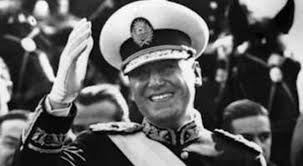
Argentina - Juan Domingo Perón (1895-1974) As an army colonel, he participated in a coup in 1943, became Minister of Labor, and introduced reforms that won him strong support from workers and many union leaders. He was elected president in 1946 on a nationalist and populist program but was ousted in a coup in 1955. During his long exile in Franco’s Spain, the Personist movement split into left and right wing factions. After returning to Argentina, Peron was reelected in 1973 and moved to the right, repressing the leftist Peronist sectors that then took up armed struggle. After he died in office in 1974, his second wife Isabel succeeded him but was overthrown by the military in 1976, ushering in the period of extreme repression known as the “dirty war.”
Argentina - Juan Domingo Perón

Juan Domingo Perón (1895-1974) As an army colonel, he participated in a coup in 1943, became Minister of Labor, and introduced reforms that won him strong support from workers and many union leaders. He was elected president in 1946 on a nationalist and populist program but was ousted in a coup in 1955. During his long exile in Franco’s Spain, the Personist movement split into left and right wing factions. After returning to Argentina, Peron was reelected in 1973 and moved to the right, repressing the leftist Peronist sectors that then took up armed struggle. After he died in office in 1974, his second wife Isabel succeeded him but was overthrown by the military in 1976, ushering in the period of extreme repression known as the “dirty war.”
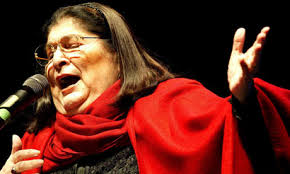
Argentina - Mercedes Sosa Known for her powerful voice and stage presence, Mercedes Sosa (1939-2009) was a leading artist in the Latin American New Song Movement. For her advocacy of social justice and defense of human rights, she was known as “the voice of the voiceless.” She went into exile during the “dirty war” in Argentina after the junta banned her music.
Argentina - Mercedes Sosa

Mercedes Sosa Known for her powerful voice and stage presence, Mercedes Sosa (1939-2009) was a leading artist in the Latin American New Song Movement. For her advocacy of social justice and defense of human rights, she was known as “the voice of the voiceless.” She went into exile during the “dirty war” in Argentina after the junta banned her music.

Paraguay - Fernando Lugo Growing up under the 35-year Stroessner dictatorship, Fernando Lugo (born 1951) became a priest who supported peasant demands for land reform. Known as the “bishop of the poor” his victory in the presidential election of 2008 ended the 60 year rule of the right-wing Colorado party. He was impeached in 2012 in a “Congressional coup” denounced by most UNASUR countries. He was subsequently elected to the Senate.
Paraguay - Fernando Lugo

Growing up under the 35-year Stroessner dictatorship, Fernando Lugo (born 1951) became a priest who supported peasant demands for land reform. Known as the “bishop of the poor” his victory in the presidential election of 2008 ended the 60 year rule of the right-wing Colorado party. He was impeached in 2012 in a “Congressional coup” denounced by most UNASUR countries. He was subsequently elected to the Senate.
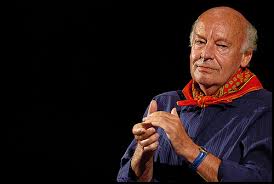
Uraguay - Eduardo Galeano (1940-2015), Uruguayan writer and activist, is known for The Open Veins of Latin America: Five Centuries of the Pillage of a Continent (1971) and the Memory of Fire trilogy (1982-86) , among many other literary and journalistic works. In 1973 he was forced into exile when the military took power. Hugo Chavez gave a copy of Open Veins to President Obama at the Summit of the Americas in 2009.
Uraguay - Eduardo Galeano

Eduardo Galeano (1940-2015), Uruguayan writer and activist, is known for The Open Veins of Latin America: Five Centuries of the Pillage of a Continent (1971) and the Memory of Fire trilogy (1982-86) , among many other literary and journalistic works. In 1973 he was forced into exile when the military took power. Hugo Chavez gave a copy of Open Veins to President Obama at the Summit of the Americas in 2009.
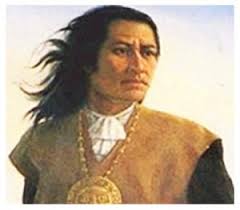
Peru - Tupac Amaru II (1742-1781) a descendant of Tupac Amaru, the last Inca emperor, led an uprising against Spanish rule in 1780 and was brutally executed by the Spanish who beheaded and dismembered him. He has become a symbol of the defense of indigenous rights. The Tupac Amaru Revolutionary Movement in the 1980s took his name.
Peru - Tupac Amaru II

Tupac Amaru II (1742-1781) a descendant of Tupac Amaru, the last Inca emperor, led an uprising against Spanish rule in 1780 and was brutally executed by the Spanish who beheaded and dismembered him. He has become a symbol of the defense of indigenous rights. The Tupac Amaru Revolutionary Movement in the 1980s took his name.
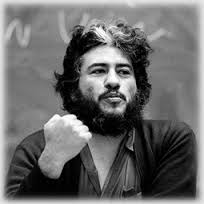
Peru - Hugo Blanco (born 1934) has led many revolutionary indigenous and peasant struggles and has been a leader of several Trotskyist parties and the Fourth International. He has been repeatedly imprisoned and exiled. He has served in Congress, run for president, and now publishes Lucha Indígena in which he advocates ecosocialism and Zapatista-style forms of political organizing.
Peru - Hugo Blanco

Peru - Hugo Blanco (born 1934) has led many revolutionary indigenous and peasant struggles and has been a leader of several Trotskyist parties and the Fourth International. He has been repeatedly imprisoned and exiled. He has served in Congress, run for president, and now publishes Lucha Indígena in which he advocates ecosocialism and Zapatista-style forms of political organizing.
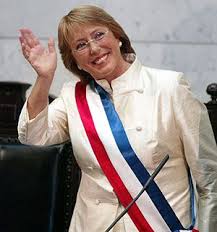
Chile - Michelle Bachelet (born 1951), is a leader of the Socialist party who became Chile’s first woman president, first serving from 2006 to 2010 and reelected in 2014. As a member of the Socialist Youth in 1970, she supported the Allende government. After the Pinochet coup, she and her mother participated in the resistance, were arrested, tortured, and forced into exile. Her father, an Air Force Brigadier General who opposed the coup, had died in prison after being tortured.
Chile - Michelle Bachelet

Michelle Bachelet (born 1951), is a leader of the Socialist party who became Chile’s first woman president, first serving from 2006 to 2010 and reelected in 2014. As a member of the Socialist Youth in 1970, she supported the Allende government. After the Pinochet coup, she and her mother participated in the resistance, were arrested, tortured, and forced into exile. Her father, an Air Force Brigadier General who opposed the coup, had died in prison after being tortured.

Chile - Violeta Parra (1917-1967,) internationally renowned folklorist, singer-songwriter and Communist party member, is considered the “mother of the Latin American New Song Movement” that created socially-conscious music using traditional folk instruments and musical forms. Her songs dealt with the full range of human experience from the joys celebrated in Gracias a la Vida to protest songs that denounced Chile as “the center of injustice.”
Chile - Violeta Parra

Violeta Parra (1917-1967,) internationally renowned folklorist, singer-songwriter and Communist party member, is considered the “mother of the Latin American New Song Movement” that created socially-conscious music using traditional folk instruments and musical forms. Her songs dealt with the full range of human experience from the joys celebrated in Gracias a la Vida to protest songs that denounced Chile as “the center of injustice.”
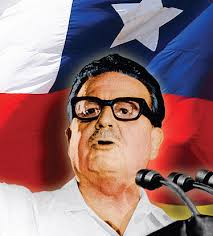
Chile - Salvador Allende (1908-1973), a Marxist who advocated the democratic “peaceful road” to socialism, was elected president in 1970 as the candidate of the broad Unidad Popular coalition which included Marxist parties, Christian left parties, and secular reformist parties. After a three-year destabilization campaign by the right backed by the U.S., he was overthrown in the coup of Sept. 11, 1973 which brought to power the 17 year Pinochet dictatorship that was infamous for torturing and disappearing its opponents.
Chile - Salvador Allende

Salvador Allende (1908-1973), a Marxist who advocated the democratic “peaceful road” to socialism, was elected president in 1970 as the candidate of the broad Unidad Popular coalition which included Marxist parties, Christian left parties, and secular reformist parties. After a three-year destabilization campaign by the right backed by the U.S., he was overthrown in the coup of Sept. 11, 1973 which brought to power the 17 year Pinochet dictatorship that was infamous for torturing and disappearing its opponents.

Argentina - Fernando “Pino” Solanas (born 1936) is the documentary filmmaker and theorist who, with Octavio Getino, wrote the manifesto “Toward a Third Cinema” and directed the stylistically groundbreaking La Hora de los Hornos (The Hour of the Furnaces) that denounced capitalist exploitation. Exiled during the “dirty war,” he directed the anti-neoliberal Memorias del Saqueo (2004) and La Dignidad de los Nadies (2005) in response to the Argentine crisis of 2001.
Argentina - Fernando “Pino” Solanas

Fernando “Pino” Solanas (born 1936) is the documentary filmmaker and theorist who, with Octavio Getino, wrote the manifesto “Toward a Third Cinema” and directed the stylistically groundbreaking La Hora de los Hornos (The Hour of the Furnaces) that denounced capitalist exploitation. Exiled during the “dirty war,” he directed the anti-neoliberal Memorias del Saqueo (2004) and La Dignidad de los Nadies (2005) in response to the Argentine crisis of 2001.
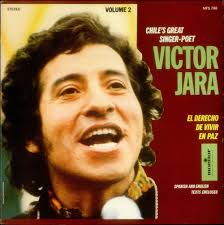
Chile - Victor Jara (1932-1973) was a singer-songwriter and theater director who was a major figure in the New Chilean Song movement that used folk instruments to create politically committed music. He was arrested during the coup against the Allende government and was beaten to death while held prisoner in Chile Stadium (not the larger, more infamous National Stadium), which after a mass campaign has been renamed Victor Jara Stadium.
Chile - Victor Jara

Victor Jara (1932-1973) was a singer-songwriter and theater director who was a major figure in the New Chilean Song movement that used folk instruments to create politically committed music. He was arrested during the coup against the Allende government and was beaten to death while held prisoner in Chile Stadium (not the larger, more infamous National Stadium), which after a mass campaign has been renamed Victor Jara Stadium.
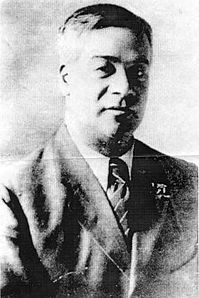
Chile - Luis Emilio Recabarren (1876-1924) was a political journalist and labor organizer among the impoverished nitrate workers in northern Chile. Imprisoned and exiled several times, he founded the Socialist Workers Party in 1912 that, inspired by the Bolshevik revolution, became the Communist Party in 1922.
Chile - Luis Emilio Recabarren

Luis Emilio Recabarren (1876-1924) was a political journalist and labor organizer among the impoverished nitrate workers in northern Chile. Imprisoned and exiled several times, he founded the Socialist Workers Party in 1912 that, inspired by the Bolshevik revolution, became the Communist Party in 1922.

Peru - César Vallejo (1892-1938) is considered one of the twentieth century’s most innovative poets. He left Peru after being briefly imprisoned for involvement in a local uprising and lived in several European countries. He visited the Soviet Union several times and worked as a journalist in Spain during the Spanish Civil War.
Peru - César Vallejo

César Vallejo (1892-1938) is considered one of the twentieth century’s most innovative poets. He left Peru after being briefly imprisoned for involvement in a local uprising and lived in several European countries. He visited the Soviet Union several times and worked as a journalist in Spain during the Spanish Civil War.
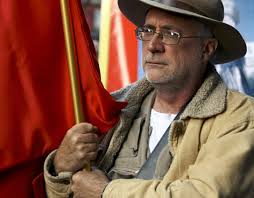
Mexico - Javier Sicilia (born 1956), a prominent poet, essayist, and journalist became a leader of the movement against the war on drugs in Mexico after his son was murdered by a drug gang. He organized national protests in Mexico and a caravan around the U.S. to demand an end to the militarized U.S. anti-drug policy.
Mexico - Javier Sicilia

Javier Sicilia (born 1956), a prominent poet, essayist, and journalist became a leader of the movement against the war on drugs in Mexico after his son was murdered by a drug gang. He organized national protests in Mexico and a caravan around the U.S. to demand an end to the militarized U.S. anti-drug policy.
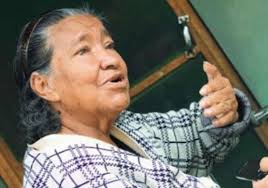
Bolivia -Domitila Barrios de Chúngara (1937-2012) was a leader in the Housewives’ Committee at the Siglo XX tin mine, which militantly supported miners’ struggles. For her labor activism and opposition to a series of dictators, she was imprisoned several times and subjected to internal exile. She also espoused a working class feminism focused on economic justice. She is known for her autobiography Let Me Speak! which recounted her transformation into a Marxist political activist.
Bolivia - Domitila Barrios de Chúngara

Domitila Barrios de Chúngara (1937-2012) was a leader in the Housewives’ Committee at the Siglo XX tin mine, which militantly supported miners’ struggles. For her labor activism and opposition to a series of dictators, she was imprisoned several times and subjected to internal exile. She also espoused a working class feminism focused on economic justice. She is known for her autobiography Let Me Speak! which recounted her transformation into a Marxist political activist.
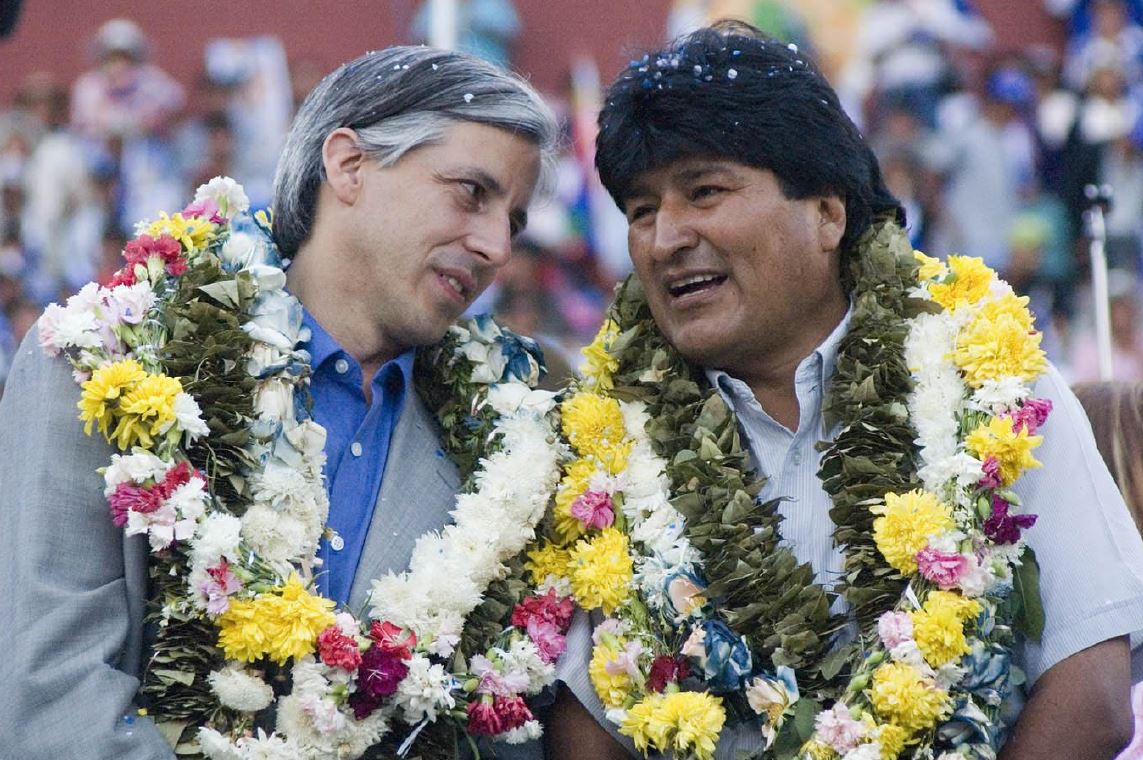
Bolivia - Evo Morales with VP Álvaro García Linera Álvaro García Linera (born 1962), is a respected academic sociologist and political theorist who has served as Vice President of Bolivia since 2006. A strong advocate of indigenous rights, he was arrested and imprisoned for participation in the Tupac Katari indigenous guerrilla army. He later became active in developing the MAS (Movement toward Socialism.).
Evo Morales (born 1959), former leader of the coca growers union, became the first indigenous president in Latin America in 2006 as the candidate of the Movement toward Socialism (MAS) on an anti-neoliberal, anti-imperialist program advocating plurinationalism, decolonization, and Suma Qamaña (living well). He was elected to his third term in 2014.
Bolivia - Evo Morales with VP Álvaro García Linera

Bolivia - Evo Morales with VP Álvaro García Linera Álvaro García Linera (born 1962), is a respected academic sociologist and political theorist who has served as Vice President of Bolivia since 2006. A strong advocate of indigenous rights, he was arrested and imprisoned for participation in the Tupac Katari indigenous guerrilla army. He later became active in developing the MAS (Movement toward Socialism.).
Evo Morales (born 1959), former leader of the coca growers union, became the first indigenous president in Latin America in 2006 as the candidate of the Movement toward Socialism (MAS) on an anti-neoliberal, anti-imperialist program advocating plurinationalism, decolonization, and Suma Qamaña (living well). He was elected to his third term in 2014.
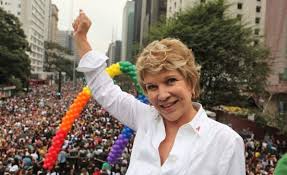
Brazil - Marta Suplicy (born 1945) was the Workers Party mayor of São Paulo from 2001-2004. She later became the first woman federal Senator from São Paulo. In the Senate, she has been a leader on gender issues, including introducing a bill for same sex civil unions which were later legalized by the Supreme Court. She is now running for re-election as mayor in 2016 as the candidate of the PSB (Brazilian Socialist Party.)
Brazil - Marta Suplicy

Marta Suplicy (born 1945) was the Workers Party mayor of São Paulo from 2001-2004. She later became the first woman federal Senator from São Paulo. In the Senate, she has been a leader on gender issues, including introducing a bill for same sex civil unions which were later legalized by the Supreme Court. She is now running for re-election as mayor in 2016 as the candidate of the PSB (Brazilian Socialist Party.)
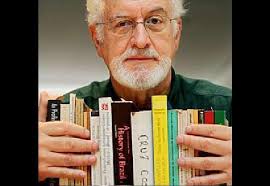
Brazil - Caio da Silva Prado Júnior (1907-1990) was a groundbreaking Marxist historian and political economist who analyzed the formation of Brazilian social structures and their contradictions in seminal books such as Evolução política do Brasil (1933) and Formação do Brasil Contemporâneo (1942). He joined the Communist Party in 1931 after becoming disillusioned with the Revolution of 1930, was elected as a state deputy in 1945, and served until the party was banned in 1948. His role as a public intellectual included editing a newspaper and founding a publishing house and magazine.
Brazil - Caio da Silva Prado Júnior

Caio da Silva Prado Júnior (1907-1990) was a groundbreaking Marxist historian and political economist who analyzed the formation of Brazilian social structures and their contradictions in seminal books such as Evolução política do Brasil (1933) and Formação do Brasil Contemporâneo (1942). He joined the Communist Party in 1931 after becoming disillusioned with the Revolution of 1930, was elected as a state deputy in 1945, and served until the party was banned in 1948. His role as a public intellectual included editing a newspaper and founding a publishing house and magazine.
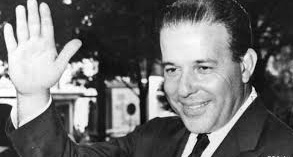
Brazil - João (Jango) Goulart (1918-1976) was the left-leaning nationalist president of Brazil from 1961 to 1964. Because of his reformist policies, which included nationalizing an ITT subsidiary and land reform, he was overthrown in a military coup which received active U.S. support in the Cold War atmosphere following the Cuban Revolution. The coup initiated the wave of repressive U.S.-backed “National Security States” that would dominate Latin America through the 1980s.
Brazil - João (Jango) Goulart

João (Jango) Goulart (1918-1976) was the left-leaning nationalist president of Brazil from 1961 to 1964. Because of his reformist policies, which included nationalizing an ITT subsidiary and land reform, he was overthrown in a military coup which received active U.S. support in the Cold War atmosphere following the Cuban Revolution. The coup initiated the wave of repressive U.S.-backed “National Security States” that would dominate Latin America through the 1980s.
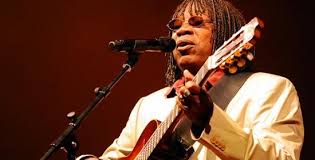
Brazil - Milton Nascimento (born 1942) is a singer-songwriter whose song Coração de Estudante (Student's Heart,) which protested the killing of a student by police in 1968 during the dictatorship, was later adopted by the Diretas Já (Direct Elections Now) campaign to restore democracy in 1984.
Brazil - Milton Nascimento

Milton Nascimento (born 1942) is a singer-songwriter whose song Coração de Estudante (Student's Heart,) which protested the killing of a student by police in 1968 during the dictatorship, was later adopted by the Diretas Já (Direct Elections Now) campaign to restore democracy in 1984.
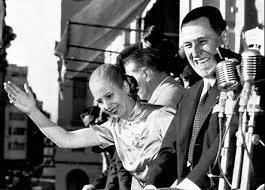
Juan Domingo Perón (1895-1974) and his wife Eva (Evita) Duarte de Perón (1919-1952) transformed Argentine politics. Peron was the first to recognize the potential power of organized labor which became the political base of his populist movement and fueled his rise to the presidency. Evita beame a heroine of the descamisados (poor) for the aid provided by her charitable foundation. Despite dividing into many competing tendencies, Peronism remains a dominant force in Argentine politics.
Argentina - Eva and Domingo Peron

Juan Domingo Perón (1895-1974) and his wife Eva (Evita) Duarte de Perón (1919-1952) transformed Argentine politics. Peron was the first to recognize the potential power of organized labor which became the political base of his populist movement and fueled his rise to the presidency. Evita beame a heroine of the descamisados (poor) for the aid provided by her charitable foundation. Despite dividing into many competing tendencies, Peronism remains a dominant force in Argentine politics.

Argentina - Mothers of the Plaza de Mayo During the “dirty war” from 1976 to 1983, during which an estimated 30,000 people were “disappeared” by the military government, mothers of the disappeared, wearing white head scarves and carrying photos of the missing, organized weekly marches in front of the presidential palace to demand the return of their children. After the return to elected government, they continued to march for justice and the return of grandchildren born to imprisoned mothers and illegally given to military families or other supporters of the junta.
Argentina - Mothers of the Plaza de Mayo

Mothers of the Plaza de Mayo During the “dirty war” from 1976 to 1983, during which an estimated 30,000 people were “disappeared” by the military government, mothers of the disappeared, wearing white head scarves and carrying photos of the missing, organized weekly marches in front of the presidential palace to demand the return of their children. After the return to elected government, they continued to march for justice and the return of grandchildren born to imprisoned mothers and illegally given to military families or other supporters of the junta.
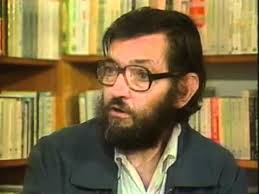
Argentina - Julio Cortázar, (1914-1984), was the innovative and influential author of Rayuela (Hopscotch) and other novels and short stories who began his literary career in Argentina but moved to France in 1951. Despite living in Europe, he was an active defender of human rights in Latin America and supporter of the Cuban Revolution, the Allende government in Chile, and the Sandinista revoluiton in Nicaragua.
Argentina - Julio Cortázar

Julio Cortázar, (1914-1984), was the innovative and influential author of Rayuela (Hopscotch) and other novels and short stories who began his literary career in Argentina but moved to France in 1951. Despite living in Europe, he was an active defender of human rights in Latin America and supporter of the Cuban Revolution, the Allende government in Chile, and the Sandinista revoluiton in Nicaragua.

Chile - Pablo Neruda (1904-1973) was the world-renowned poet who won the Nobel Prize for Literature for works such as Canto General. an epic treatment of Latin America. In Spain during the Civil War, he became a Communist and, after his return to Chile, was elected Senator. Temporarily exiled when the party was outlawed in 1948, he later became Allende’s ambassador to France. He died of cancer in Chile just days after the coup that overthrew Allende’s government.
Chile - Pablo Neruda

Pablo Neruda (1904-1973) was the world-renowned poet who won the Nobel Prize for Literature for works such as Canto General. an epic treatment of Latin America. In Spain during the Civil War, he became a Communist and, after his return to Chile, was elected Senator. Temporarily exiled when the party was outlawed in 1948, he later became Allende’s ambassador to France. He died of cancer in Chile just days after the coup that overthrew Allende’s government.
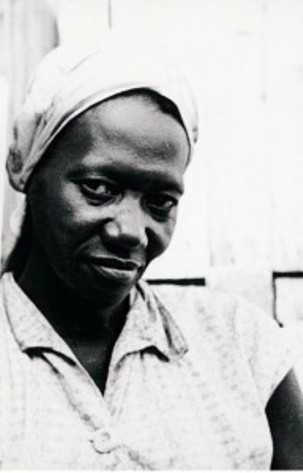
Brazil - Carolina Maria de Jesus (1914-1977) was a migrant from rural Minas Gerais to a São Paolo favela (shantytown). Despite limited formal education, she kept a diary about daily life in the slum which became the best-selling book, Quarto de Despejo (titled Child of the Dark in English). which was translated into thirteen languages.
Brazil - Carolina Maria de Jesus

Brazil - Carolina Maria de Jesus (1914-1977) was a migrant from rural Minas Gerais to a São Paolo favela (shantytown). Despite limited formal education, she kept a diary about daily life in the slum which became the best-selling book, Quarto de Despejo (titled Child of the Dark in English). which was translated into thirteen languages.

Argentina - Ernesto “Che” Guevara (1928-1967), Argentine-born revolutionary Marxist, was second in command to Fidel Castro during the war against Batista and held important positions in the Cuban revolutionary government. He is known for believing that the revolution would create a “new (hu)man” motivated by commitment to the common good. He left Cuba to create a guerrilla “foco” in Bolivia, where he was killed by CI.A- supported government forces.
Argentina - Ernesto “Che” Guevara

Ernesto “Che” Guevara (1928-1967), Argentine-born revolutionary Marxist, was second in command to Fidel Castro during the war against Batista and held important positions in the Cuban revolutionary government. He is known for believing that the revolution would create a “new (hu)man” motivated by commitment to the common good. He left Cuba to create a guerrilla “foco” in Bolivia, where he was killed by CI.A- supported government forces.
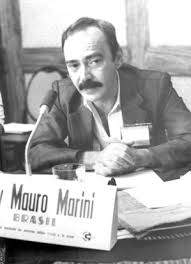
Brazil - Ruy Mauro Marini (1932-1997) was a Brazilian political economist whose major contributions to dependency theory were the concepts of superexploitation and sub-imperialism. He argued for the necessity of revolutionary struggle against national ruling classes and imperialism. In exile in Chile during the Brazilian dictatorrship, he became a leader of the MIR (Movement of the Revolutionary Left.) He was an editor of LAP for 16 years.
Brazil - Ruy Mauro Marini

Ruy Mauro Marini (1932-1997) was a Brazilian political economist whose major contributions to dependency theory were the concepts of superexploitation and sub-imperialism. He argued for the necessity of revolutionary struggle against national ruling classes and imperialism. In exile in Chile during the Brazilian dictatorrship, he became a leader of the MIR (Movement of the Revolutionary Left.) He was an editor of LAP for 16 years.

Brazil - Chico Mendes (1944-1988), who began working as a rubber tapper as a child, became a leader of the rubber tappers union who fought to protect the Amazon by creating “extractive reserves” for sustainble development. He won international recognition for his environmental leadership. He was murdered by a rancher who wanted to log in a protected area.
Brazil - Chico Mendes

Chico Mendes (1944-1988), who began working as a rubber tapper as a child, became a leader of the rubber tappers union who fought to protect the Amazon by creating “extractive reserves” for sustainble development. He won international recognition for his environmental leadership. He was murdered by a rancher who wanted to log in a protected area.
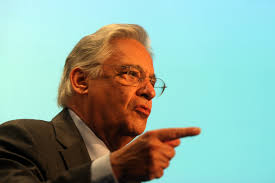
Brazil - Fernando Henrique Cardoso (born 1931) was well known as a sociologist before becoming a two term president of Brazil from 1995 to 2003. He was an influential writer in the associated dependency current of dependency theory and published an article on that subject in the first issue of Latin American Perspectives. Despite this identification with the center-left, as president he implemented neoliberal policies including extensive privatizations.
Brazil - Fernando Henrique Cardoso

Fernando Henrique Cardoso (born 1931) was well known as a sociologist before becoming a two term president of Brazil from 1995 to 2003. He was an influential writer in the associated dependency current of dependency theory and published an article on that subject in the first issue of Latin American Perspectives. Despite this identification with the center-left, as president he implemented neoliberal policies including extensive privatizations.

Brazil - Chico Buarque (born 1944) is a singer-songwriter whose "Apesar de Você" ("In spite of You") was adapted as a defiant anthem by the democratic opposition to the Brazilian military dictatorship, leadiing to the banning of all his music. He was also active in organizing Peace Concerts in solidarity with the struggles in Central America in the 1980s. An award-winning novelist in Brazil, he won the 2013 Casa de las Américas prize for Leita derramada (Spilt Milk) for narrative fiction
Brazil - Chico Buarque

Brazil - Chico Buarque (born 1944) is a singer-songwriter whose "Apesar de Você" ("In spite of You") was adapted as a defiant anthem by the democratic opposition to the Brazilian military dictatorship, leadiing to the banning of all his music. He was also active in organizing Peace Concerts in solidarity with the struggles in Central America in the 1980s. An award-winning novelist in Brazil, he won the 2013 Casa de las Américas prize for Leita derramada (Spilt Milk) for narrative fiction
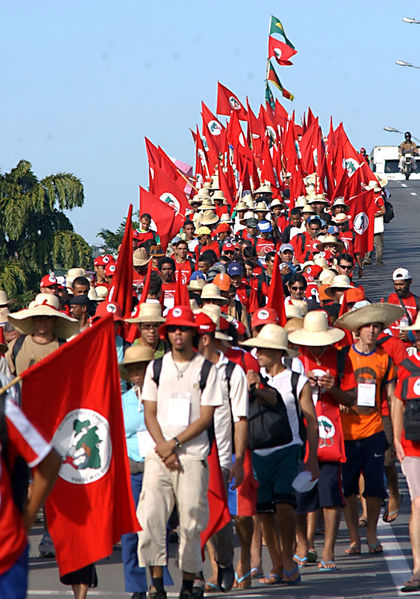
Brazil - Landless Workers Movement, Movimento dos Trabalhadores Rurais Sem Terra (MST) is a mass social movement that has fought for land reform and against injustice and social inequality in rural areas since 1984. It has led more than 2,500 land occupations, with about 370,000 families now living on 7.5 million hectares of land that they won as a result of the occupations. The MST has inspired similar movements in other countries such as Bolivia.
MST

Brazil - Landless Workers Movement, Movimento dos Trabalhadores Rurais Sem Terra (MST) is a mass social movement that has fought for land reform and against injustice and social inequality in rural areas since 1984. It has led more than 2,500 land occupations, with about 370,000 families now living on 7.5 million hectares of land that they won as a result of the occupations. The MST has inspired similar movements in other countries such as Bolivia.

Puerto Rico - Pedro Albizu Campos (1891-1965,) a child when the U.S. annexed Puerto Rico in 1898 after the Spanish-American war, became a leader of the nationalist movement seeking independence. He was president of the Nationalist Party from 1930 to 1965, even while imprisoned for 26 years for attempting to overthrow U.S. rule. Peaceful Nationalist protests were violently repressed and armed uprisings in Jayuya and Utuado led to U.S. bombing those towns. Albizu suffered from severe skin and other ailments which may have resulted from exposure to radiation experiments in prison. The U.S. admitted to conducting such experiments on prisoners but not specifically on Albizu.
Puerto Rico - Pedro Albizu Campos

Pedro Albizu Campos (1891-1965,) a child when the U.S. annexed Puerto Rico in 1898 after the Spanish-American war, became a leader of the nationalist movement seeking independence. He was president of the Nationalist Party from 1930 to 1965, even while imprisoned for 26 years for attempting to overthrow U.S. rule. Peaceful Nationalist protests were violently repressed and armed uprisings in Jayuya and Utuado led to U.S. bombing those towns. Albizu suffered from severe skin and other ailments which may have resulted from exposure to radiation experiments in prison. The U.S. admitted to conducting such experiments on prisoners but not specifically on Albizu.
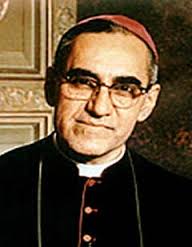
El Salvador - Archbishop Oscar Romero (1917-1980) of El Salvador was assassinated by a right-wing death squad in March 1980 for his defense of human rights and call for members of the Salvadoran military to refuse orders to repress the population. He also asked the U.S. to stop arming the military, a request ignored by the Reagan administration. He has been beatified by Pope Francis, a step toward sainthood.
El Salvador - Archbishop Oscar Romero

Archbishop Oscar Romero (1917-1980) of El Salvador was assassinated by a right-wing death squad in March 1980 for his defense of human rights and call for members of the Salvadoran military to refuse orders to repress the population. He also asked the U.S. to stop arming the military, a request ignored by the Reagan administration. He has been beatified by Pope Francis, a step toward sainthood.
